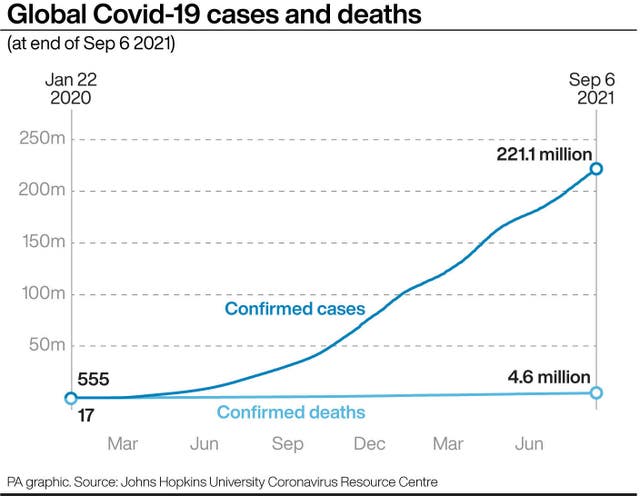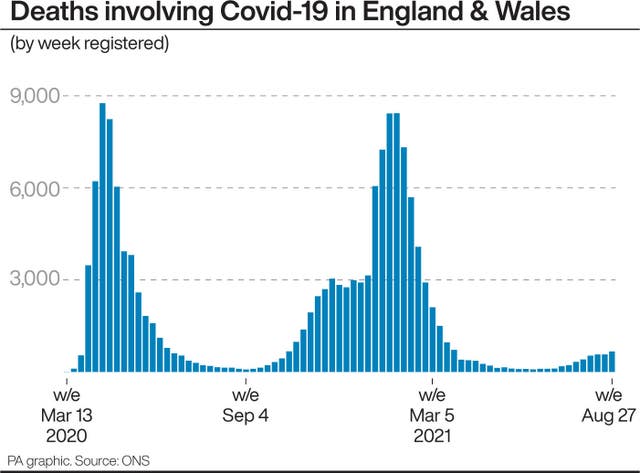Vaccines minister says he has not seen any ‘firebreak’ plans
Nadhim Zahawi said coronavirus will be ‘with us for many years’ but he hopes ‘severe measures’ will not be needed in future.

A Government minister said he has seen no plans for an October “firebreak” lockdown if cases rise this autumn.
Vaccines minister Nadhim Zahawi said he hopes the virus can be dealt with “year in, year out” without having to take the “severe measures” seen last December.
His comments come after the i newspaper reported an unnamed member of the Scientific Advisory Group for Emergencies (Sage) saying a “precautionary break” could be part of “contingency plans”.
The paper quoted another unnamed source saying that “a firebreak lockdown is by no means out of the question”.
Such a plan could lead to a two-week school half-term instead of one week, the i said.
But Mr Zahawi said he had not seen any such plans.
He told BBC Breakfast: “Look, vaccines have given us the ability to reduce infections, to save 100,000 lives.
“It is through the booster programme that I hope … we can transition the virus from pandemic to endemic status and deal with it year in, year out.
“It is going to be with us for many years – but not have to close down our economy or take the severe measures we had to sadly take in December of last year.”
Asked about the firebreak reports on LBC radio, Mr Zahawi said: “I haven’t seen any plans around this.”
He also said a quarter of his staff are working from Whitehall at any one time but suggested he would look to increase that number.
When it was put to him that workers were being encouraged to return to offices while at the same time the majority of his office is still empty, the minister told LBC: “We continue to make sure we get people back as quickly as possible, as safely as possible, it is the right thing to do.
“Look, we have to lead by example and I will take your message and personally make sure that we continue on with the staff, because it is important that people come back, and come back safely.”

It comes as a leading academic said it was “concerning” that some people feel they are no longer at risk so have stopped taking steps to protect others.
Professor Robin Shattock, head of mucosal infection and immunity at Imperial College London, said that the need to wear masks in crowded spaces and public transport was “still very relevant”.
Asked about whether preventative measures are still needed, and a lack of social distancing and mask-wearing in Parliament, Prof Shattock told Times Radio: “I think it’s better to think of it as transitioning to normality, and we’re all going in the right direction, rather than ‘everything is in place one day and the next day, everything is off’.
“So I think people still need to be cautious and certainly in crowded spaces, public transport, the need to wear masks to protect others is still very relevant.
“And it is concerning that some people feel that they no longer are at threat themselves and so they’re not taking the precautions to protect other people.”
Meanwhile Prof Shattock, who leads the Imperial vaccine programme, said that next winter elderly people and the vulnerable may be given an updated booster vaccine.
The Joint Committee on Vaccination and Immunisation (JCVI) is preparing to make a decision on booster jabs for the winter, with no announcement made yet.
On whether or not vaccines need to be tweaked, Prof Shattock said: “Over time people will watch to see whether the Delta variant remains stable and globally dominant.
“And if it does then I think people will look to update the vaccine over time.
“In the short term, we already know that the vaccines are effective at preventing serious illness from the Delta variant so there isn’t a pressing need to rush quickly, although this can be done in a relatively short order, probably a period of six months.”

Asked about boosters looking forward, he continued: “It’s difficult to predict because it’s a bit like looking in a crystal ball.
“But if I was having to think what’s the most likely scenario, I would imagine that as we come round to the winter of next year we will be looking to boost at least the elderly and vulnerable populations, most likely with an updated vaccine.”
The UK’s chief medical officers are currently reviewing the wider benefits of vaccinating 12-15 year-olds, such as minimising school absences, after the JCVI declined to recommend a widespread rollout to the age group on health grounds alone.
Schools minister Nick Gibb has said consent from parents of healthy 12 to 15-year-olds will “be sought” if Covid-19 vaccinations are approved for their children.
But, speaking to the Education Select Committee on Tuesday, he acknowledged that in some “rare” circumstances, like in previous vaccination programmes, teenagers can consent themselves, adding: “The people administering vaccines in schools are aware of these sensitive issues.”





